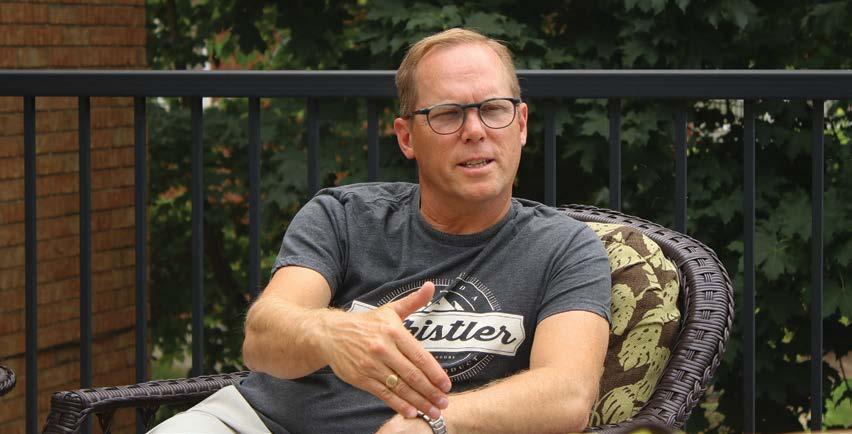
8 minute read
Hands-on angel investing
Hands-on angel investing
Evaluating people and crunching numbers key to success for New Hamburg man
Advertisement
Successful angel investing — providing funds to early stage companies — requires paying attention to details, expecting high financial returns and being okay with losing everything, Dale Brubacher Cressman says.
“You’ve got to go into it recognizing you could lose your entire investment,” says the New Hamburg man. “It’s not like any other investment. If you are not prepared to lose (all) the money, you shouldn’t be investing.” Over the past 12 years, Brubacher Cressman has done four major investments. One firm failed, one has not yet provided a return after many years, another has had some moderate growth, and another achieved “a World Series winning home run” in terms of its financial payout.
“Out of four deals, I’ve done much better than the statistical average.”
“I think 10 times (the amount invested) is what you are looking for in a deal. That’s what your hopes and expectations are, for the amount of risk you are taking.”
“You don’t angel invest expecting to break even” unless doing it as part of personal charitable activity, he said.
His philosophy for success in investing is to become actively involved in companies, getting a seat on the board in order to help shape its chances for success.
“Part of me says, and this is my Mennonite ethos: If you are just throwing money at a company and hoping they will succeed, you’re just gambling.” “I don’t want it to be a game of chance. I want it to be a game of skill where you can actually influence the outcome.”
Brubacher Cressman’s faith community was a key part of his upbringing. “It definitely shaped a key part of who I am. It absolutely affects how I deal with people, how I do business.”
“There were business deals that I did not fight for because I said: ‘I don’t do business that way, and I don’t want to do business with somebody who does.’ If it means giving up that business opportunity, that’s fine. I’ve got lots of other business opportunities.”
He recognizes that he has been fortunate not to have to be chasing dollars and has had business partners who share the ethic of being unwilling to compromise their values. “I think that perspective helps me in evaluating people. That’s a

photo by Kamil Ahmed Dale Brubacher Cressman makes a point about his investing philsophy
big part of professional investment, knowing who you are investing in, being able to discern somebody who has an approach that’s compatible with your ethic.”
Brubacher Cressman began investing in start-ups after leaving Waterloo tech firm Research in Motion (now Blackberry. See sidebar.) A decade ago, he was both an investor and working at drone developer Aeryon Labs, which eventually provided his biggest investment win. At the same time, he was helping to launch renewable energy firm Vigor Clean Tech (now known as VCT Group). Within two weeks of starting to work full-time at Aeryon, he was approached to help with Vigor and began second-guessing his choice. “Happenstance or divine guidance? You be the judge.” Aeryon’s early philosophy was to “build cool stuff and have fun doing it.” e firm started with a variety of robotic flying machines before settling on quad rotor drones. Brubacher Cressman worked at prototyping and researching suppliers. Aeryon grew from building flying cameras to comprehensive systems, achieving sales of $20 million before being acquired by a US company for $200 million in January.
Brubacher Cressman’s investment in renewable energy came from a sense of the need to be a good steward of the planet and reduce carbon impact.
Vigor originally planned to do small scale, run-of-river hydroelectric power generation. Buying 50 per cent of a US firm that was working on a technology to provide run-of-river hydro resulted in a total loss after several years. “At the end of the day, we didn’t have a product to sell.’’ Vigor pivoted towards installing rooftop turbines to provide wind power. As clients continually asked them about solar power, the firm refocused again to become a solar systems provider.
Shortly thereafter, the Ontario government announced a program that provided generous financial incentives for businesses and homeowners to install solar panels. A multitude of players rushed into the solar business. When government support was phased out, the industry contracted. Less than 10 per cent of those companies still exist. There are niche opportunities in solar, where businesses can get a payback of a few years or less on their investment, he said. Brubacher Cressman is still a board member and shareholder at Vigor/VCT but stepped away from active management three years ago. VCT manages a related solar firm, the Community Energy Development (CED) Co-operative, of which he is a director. CED has provided opportunities for economic development “in communities that could use it,” he said.
It has given people a chance to invest in solar without being directly involved in the business.
He has made two new investments since Aeryon was acquired. “The Aeryon win has basically allowed me to look at another round of angel investments.”
eleven-x, an Internet of Things company, has tremendous potential in a challenging business segment because they have a strong team, he
said. He is also bullish on the prospects of Vancouver firm VeloMetro Mobility (see sidebar below). There are a number of organized networks for angel investors across Canada and the United States. Brubacher Cressman has attended a few meetings of an area group, but found “that just doesn’t resonate with me.” “I’m pretty picky on what companies I will invest in at this point,” he says.
Brubacher Cressman doesn’t share a view of investing in as many companies as possible in the hopes one will do well. “I have generally taken the approach that I want to take a significant position in a few companies, but I don’t spread myself too thin, so I can be actively involved with the company.”
Being discerning and doing the homework needed to understand a start-up’s chances of success is a guiding principle in his investment approach.
He is specific about sticking to investments in the tech sector, only putting money into firms he understands or where he can bring some unique perspective to the table.
eleven-X, which works in the wireless technology space, can benefit from his experience working in wireless at RIM, he believes.
Investing is a retirement career that he pursues in a fashion that still leaves him time to indulge interests in musical theatre, travel, golf and volunteering. He also meets with start-ups, some started by former colleagues who are seeking advice. “A lot of it is, I’m continually learning more and more. I enjoy it, I feel like maybe I’m making a difference, and it doesn’t cost me much.” ◆
Investment in British Columbia firm was years in the making
For Dale Brubacher Cressman, due diligence on a prospective investment might be measured in seasons rather than months.
He spent two years evaluating a Vancouver-based firm before investing in them and joining their board. VeloMetro Mobility makes an electric-assisted, three-wheel enclosed vehicle used for bike-sharing on bike paths in city environments. Half car and half bike, it is a rentable vehicle that claims to provide the convenience of a car and the freedom of a bike. It can travel 100 km on a charge.
The company has done a trial at the University of British Columbia and is working on a production version of its Veemo product. Company president Kody Baker appeared on the CBC Dragon’s Den TV show early this year, seeking a $1 million investment in exchange for five per cent of the company after raising $7 million in investments and grants to that point. Most panelists balked at the capital costs involved in scaling the business. Baker accepted Arlene Dickinson’s counter-offer of $1 million for a 7.5 per cent stake in the firm. Canadian readers can view that pitch at this web address: https://www.velometro.com/dragons-den/ At time of this writing, VeloMetro said the deal is still in process. ◆

Veemo is an electric assisted ridesharing vehicle that can operate in Vancouver bike lanes.

photo courtesy VeloMetro Mobility
Love changed investor’s career path
Brubacher Cressman was raised on a farm near New Hamburg, ON, west of Kitchener. He studied systems design engineering at University of Waterloo. After graduating, he started his career in Ottawa at Cognos, a software company now owned by IBM.
But he returned to Waterloo Region a little over a year later “for true love.”
When his future wife, Cheryl, said she had no intention of following him to Ottawa, he started looking for jobs back home.
That move paid off personally and professionally. Dale and Cheryl celebrated their 30th wedding anniversary earlier this year. He applied to a small Waterloo start-up after reading about it on a UseNet bulletin board (aforerunner to modern web pages).
The firm offered him a job as employee number five two hours after he visited to drop off his resume and introduce himself. Startled by the quick offer, “I said to (company co-founder) Mike Lazaridis, why don’t you take the weekend to think about it,” he recalls.
By the time Brubacher Cressman left the company 17 years later, Research in Motion was known worldwide. RIM had transformed itself from a struggling contract manufacturer to a smartphone pioneer (later renamed Blackberry, after its flagship product), with revenue of more than $1.3 billion, thousands of employees and millions of subscribers.
Along the way, he got to attend the Oscars with Lazaridis to see RIM win a technical award for a film editing product. He received a patent for a backlight timer for handheld wireless devices, which are standard in mobile phones today.
He also ended up in a financial position to decide what he wanted to do next. Not that it was smooth sailing in the early days. He admits to once being told by Lazaridis that the cash-strapped company might not be able to provide his paycheque on time that month.
“What I know about startups is that there's an awful lot of start-ups where that happens,” he says. ◆






